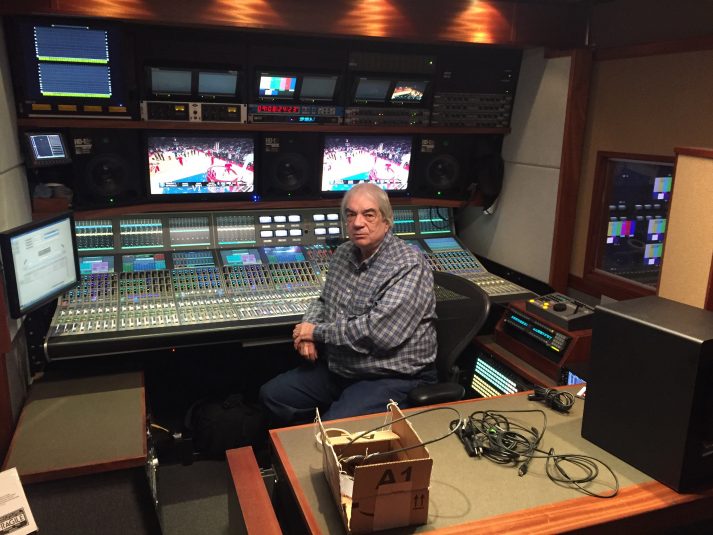NBC Olympics Audio Pioneer Bob Dixon Dies at 70
Story Highlights
The Sports Broadcasting Hall of Famer revolutionized his industry
Although he never considered himself a huge sports fan, Dixon nonetheless changed the way the world hears sports on television. Part of the first network group dedicated to Olympics production at NBC for the 1996 Atlanta Games and having worked on Olympics broadcasts since the 1984 Los Angeles Games, he guided the evolution of Olympics broadcast sound from mono to stereo (for the 1988 Seoul Summer Games) to discrete 5.1 surround (2008 Beijing Games).
In 1996, NBC secured its first long-term contract to broadcast the Olympics, which prompted creation of the NBC Olympics group. Dixon ended a long freelance career that had begun in 1979 — including remote work for ESPN, ABC, HBO, CBS, Fox, and Canadian networks CBC and TSN, mixing and designing audio for football, baseball, hockey, tennis, and boxing —when he took on the full-time position of manager of sound design for NBC Olympics in 1998. He retired from NBC after the 2012 London Games.
In that time, Dixon set new standards for broadcast audio. He helped guide the first use of matrixed 5.1 surround sound for the Opening Ceremonies of the 1996 Atlanta Olympics and of discrete 5.1 surround at the 2006 Torino Games. He was there for the first deployment of discrete 5.1 audio throughout all event venues at the 2008 Beijing Olympics. By the time of the London Games in 2012, Dixon had established dedicated 5.1-mixing environments in separate trailers with proper acoustical treatment and monitoring, and his A1s used consoles that had been adapted to his specifications, all with the goal of freeing the A1s to be better able to focus on the mix.
“Bob had an incredibly calm and gentle manner about him that he never wavered from,” remembers Dave Mazza, SVP and CTO, NBC Sports Group and NBC Olympics. “As much as we enjoyed this when planning an event, I most remember it when doing live shows with him when he was still mixing. He could be in the 10-second countdown to a live show or segment and have a major curveball thrown at him [and] he would not even flinch; he’d just adapt and change course, throw a patch if needed, and open the proper fader at zero. It was amazing!
“But the most extraordinary thing about Bob,” continues Mazza, “was how much he cared about his coworkers, and how much he cared about the product. He would do anything to help make both better in the kindest manner you’ve ever seen.”
Chip Adams, VP, venue engineering, NBC Olympics, e-mailing from Seoul, where he is preparing for the 2018 Olympics, remembered meeting Dixon when they both worked for a public-television station in Springfield, MA.
“Bob would always show up with some new piece of equipment or microphone to capture the sound of the ensemble and environment. He would search all through the rehearsals to find the right mic location, the proper equipment setting, to get the right sound of the performance, and he would do it in a courteous, gentle manner that would put the performers at ease. Bob had a passion not only for his craft but also for the friendships he acquired throughout the sports-broadcasting community.”
Later, Dixon turned his attention to other issues, such as accurate loudness measurement and monitoring, helping create the technical and best-practices foundations for the CALM Act legislation. But the Olympics remained his primary focus, and he continually refined the quality of the Games’ sound, migrating cinematic practices, such as recording blank ambient sound at venues so that dialog edits done later sounded seamless.
What audiences hear when they listen to Olympics broadcasts is the sum of what Dixon has done over 30 years of innovation. “I wished we could make it sound like a movie,” he once said of broadcast-sports audio.
Dixon’s colleagues remember him as equally dedicated to his friends and to his work, a duality reflected in his diverse education: he earned a B.A. in philosophy from Central Connecticut State University in 1975 after receiving an AAS in radio and television from Graham Junior College. Karl Malone, who succeeded him at the helm of NBC’s Olympics audio effort, remembers him as selfless. “My lasting memories of the time I spent with him, much like others will say, was his love for the people he worked with,” says Malone. “He never failed to mention that it was all about the people.”
Roger Charlesworth, executive director, DTV Audio Group, points out that Dixon was instrumental in helping that organization get started. That, he adds, underscores Dixon’s lifelong willingness to mentor and encourage: “If you worked on audio around NBC, Bob was a legendary figure. I was amazed when I got to know him how easygoing and approachable he was.”
Jim Starzynski, director/principal audio engineer, NBCUniversal, and a DTV Audio Group co-founder, echoes that appraisal: “Bob was always eager to share his time and expertise to help with our work. His input was especially important and valuable with our online tutorials that continue to help every student and professional that learns from them. In this and many, many other ways, Bob’s influence and generosity will live on.”
Fox Sports Audio Consultant Fred Aldous credits Dixon with changing the sound of sports on television. “Early in my career, I had heard of Bob Dixon as the HBO boxing mixer, his mixes legendary,” Aldous recalls. “Bob pioneered techniques that are still used today. His work as the audio designer for the NBC Olympics group will last a lifetime.”
Dixon, who lived in Waterbury, CT, might have blushed at such praise, but he also always seemed keenly aware of what his strengths and limits were. That could be observed on his LinkedIn page, where he described his ability with foreign language in terms both pithy and realistic: “I won’t starve in France or Quebec.”

